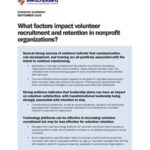Despite the relative scarcity of studies on the impact of leadership styles on satisfaction and commitment of volunteers within non-profit organizations, this relationship plays a crucial role in fostering sustained volunteerism and volunteers’ well-being. A questionnaire was administered to more than 200 volunteers involved in delivering social services in non-profit organizations from Central and Northern Italy. The questionnaire contained the Volunteer Satisfaction Index, the sub-scale on Affective Commitment of the Organizational Commitment Scale, and two sub-scales of the Key Leadership Behaviors, namely: Helping people to grow and lead, and Enabling learning and innovation. Sociodemographic data were collected as well. Findings revealed that leaders’ actions oriented toward the enablement of learning and innovation have an effect on volunteers’ affective commitment, through the full mediation of volunteer satisfaction. Leaders’ actions oriented toward the growth and empowerment of volunteers, instead, did not show significant relationships with volunteer satisfaction and affective commitment.
A Systematic Review on the Impact of Trauma-Informed Education Programs on Academic and Academic-Related Functioning for Students Who Have Experienced Childhood Adversity
The purpose of this study was to conduct a systematic review of the existing literature regarding trauma-informed education programs and their impact on academic and academic-related outcomes. The articles included for review (n=15) contained data on trauma-informed education programs implemented in preschool, primary/elementary, and high school settings. Academic and academic-related outcomes reported included attendance, disciplinary…

